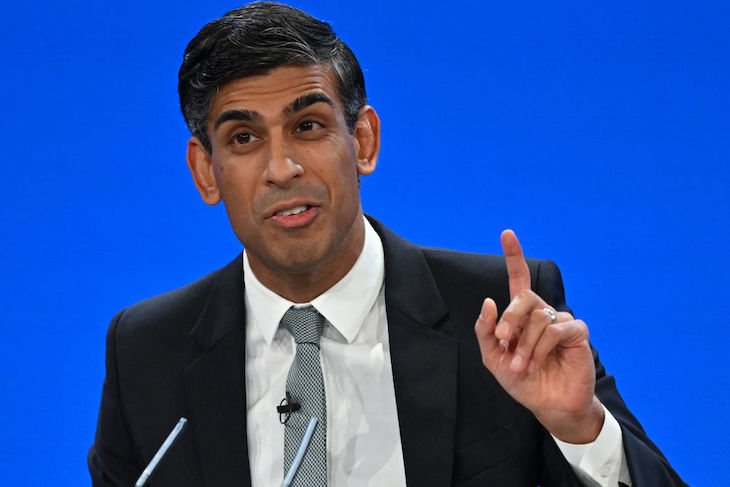In the run-up to the Conservative party conference, Rishi Sunak was promoting himself as a serious politician who wanted workable policies that respect consumer choice. No more war on motorists! No more pie-in-the-sky net zero promises! Here was a practical man in tune with the concerns of ordinary people.
Having teed himself up as a pragmatic, back-to-basics Conservative, it was all the more puzzling when, in his keynote speech, he announced a preposterous anti-smoking gimmick borrowed from Jacinda Ardern that no one was asking for. New Zealand is the only country to have taken seriously the idea of increasing the age at which people can buy cigarettes by one year every year. Last December, the Kiwis banned anyone born after 2010 from ever buying a pack of fags. It will be five years before this starts to bite, although it may be academic by then because the government is also removing nearly all the nicotine from cigarettes, so it is doubtful whether many smokers will be buying tobacco legally anyway.
Sunak announced a preposterous anti-smoking gimmick borrowed from Jacinda Ardern that no one was asking for
One way or the other, New Zealand is opening up a new front in the war on drugs. Given the dismal record of prohibition, the best approach for British politicians would be to watch from afar and see how it goes. Instead, under no pressure whatsoever, Sunak suddenly decided to wade in with the same policy. In his conference speech, he claimed that the policy was necessary because smokers put an excessive burden on the public purse, but he has spent enough time at the Treasury to know that this is nonsense.
There is no point outlining the libertarian case against prohibition. Either you think adults should have the right to smoke tobacco or you do not. Personally, I think they should, but you have to give the devil his due. The incremental approach outlined today is politically clever because few people are prepared to defend the rights of adults who smoke as it is, let alone people who might want to smoke in the future. Eventually, in about 100 years’ time, no one will be able to smoke at all. When Sunak said that this year’s conference was going to be about ‘long-term decisions’, he wasn’t kidding.
Rather than focus on the rights of the unborn smoker, let us focus on the practical reasons why this is an absurd policy. At some point in the future, a 33-year-old will be able to buy cigarettes while a 32-year-old will not. Unless my finger is even further from the pulse of public opinion than I thought, this must strike most people as absurd, and it will be scarcely less ridiculous in a few short years when some first year university students will be able to buy cigarettes while others cannot.
It takes little imagination to see that there is going to be a large informal market of cigarette sales between adults of very similar ages. Most people would agree that it is unethical to buy cigarettes for a 12-year-old, but it is hard to imagine a 26-year-old feeling guilty about buying cigarettes for a 25-year-old. The law will be seen as an ass, and rightly so. And if you can’t find a friend to buy you cigarettes on the grey market, there is already a multi-billion pound black market to serve your needs.
Now consider the retailers. They are already expected to challenge anyone seeking to buy tobacco if they look under the age of 25. In ten years’ time, they will have to challenge anyone who looks under 35. In twenty years’ time, it will be anyone who looks under 45. This is not only silly, it is also time-consuming and inconvenient. Customers will be infuriated. Tourists will be baffled. A few will become aggressive. It may ultimately require a system of national ID cards for the system to work properly.
There is a distinct possibility that Sunak’s prohibitionist wheeze will breach equalities legislation. It is essentially ageism. It is certainly discriminatory. The government cannot redefine what an adult is with an amendment tacked onto to an existing piece of legislation. Legally, this is a big deal. There will have to be consultations and a free vote. It is almost certain to be challenged in the courts.
Assuming the Conservatives lose the next election, Sunak will simply not have time to introduce this policy. He is doing exactly what he has implicitly criticised Boris Johnson and Theresa May for. He has come up with an eye-catching but fundamentally unworkable policy and is going to leave it to his successors to sort out the mess.






Comments